src/tclegg.h File Reference
#include "lush.h"#include "proto.h"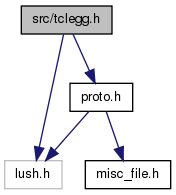

Go to the source code of this file.
Data Structures | |
| struct | timer_str |
| struct | _tcl_strings |
| struct | _tcl_int |
| struct | _tcl_coups |
| struct | _tcl_cmds |
| struct | _cd_tcl_cmd |
| struct | LocaleTable |
Defines | |
| #define | CMD_LEAVE (Function)(-1) |
| #define | MATCH_PARTIAL 0 |
| #define | MATCH_EXACT 1 |
| #define | MATCH_MASK 2 |
| #define | MATCH_CASE 3 |
| #define | MATCH_MODE 4 |
| #define | MATCH_CRON 5 |
| #define | BIND_USE_ATTR 0x010 |
| #define | BIND_STACKABLE 0x020 |
| #define | BIND_HAS_BUILTINS 0x040 |
| #define | BIND_WANTRET 0x080 |
| #define | BIND_ALTER_ARGS 0x100 |
| #define | BIND_STACKRET 0x200 |
| #define | BIND_NOMATCH 0 |
| #define | BIND_AMBIGUOUS 1 |
| #define | BIND_MATCHED 2 |
| #define | BIND_EXECUTED 3 |
| #define | BIND_EXEC_LOG 4 |
| #define | BIND_QUIT 5 |
| #define | STDVAR |
| #define | BADARGS(nl, nh, example) |
| #define | CHECKVALIDITY(a) |
Typedefs | |
| typedef struct timer_str | tcl_timer_t |
| typedef void(* | tcleventcallback )(char *, char *, int, const char *, int) |
| typedef struct _tcl_strings | tcl_strings |
| typedef struct _tcl_int | tcl_ints |
| typedef struct _tcl_coups | tcl_coups |
| typedef struct _tcl_cmds | tcl_cmds |
| typedef struct _cd_tcl_cmd | cd_tcl_cmd |
Functions | |
| void | do_tcl_async (char *, char *, tcleventcallback) |
| unsigned long | add_timer (tcl_timer_t **, int, char *, unsigned long) |
| int | remove_timer (tcl_timer_t **, unsigned long) |
| void | list_timers (Tcl_Interp *, tcl_timer_t *) |
| void | wipe_timers (Tcl_Interp *, tcl_timer_t **) |
| void | do_check_timers (tcl_timer_t **) |
| void ((void(*)(tcl_cmds *)) global[14])(tcl_cmds *) | |
| void | add_cd_tcl_cmds (cd_tcl_cmd *) |
| void ((void(*)(tcl_cmds *)) global[15])(tcl_cmds *) | |
| void | rem_cd_tcl_cmds (cd_tcl_cmd *) |
| void ((void(*)(tcl_strings *)) global[18])(tcl_strings *) | |
| void ((void(*)(tcl_strings *)) global[19])(tcl_strings *) | |
| void ((void(*)(tcl_coups *)) global[209])(tcl_coups *) | |
| void ((void(*)(tcl_coups *)) global[210])(tcl_coups *) | |
| void ((void(*)(tcl_ints *)) global[16])(tcl_ints *) | |
| void ((void(*)(tcl_ints *)) global[17])(tcl_ints *) | |
| void | do_tcl_sync (char *, char *, tcleventcallback, int) |
| const char * | tcl_resultstring () |
| int | tcl_resultint () |
| int | tcl_resultempty () |
| int | tcl_threaded () |
| int | fork_before_tcl () |
Variables | |
| static const LocaleTable | localeTable [] |
Define Documentation
| #define BADARGS | ( | nl, | |||
| nh, | |||||
| example | ) |
do { \ if ((argc < (nl)) || ((argc > (nh)) && ((nh) != -1))) { \ Tcl_AppendResult(irp, "wrong # args: should be \"", \ argv[0], (example), "\"", NULL); \ return TCL_ERROR; \ } \ } while (0)
Definition at line 138 of file tclegg.h.
Referenced by botaddr_tcl_set(), botfl_tcl_set(), console_tcl_set(), def_tcl_set(), fstat_tcl_get(), fstat_tcl_set(), hosts_tcl_get(), hosts_tcl_set(), laston_tcl_get(), laston_tcl_set(), pass_tcl_set(), tcl_addbot(), tcl_adduser(), tcl_backup(), tcl_bind(), tcl_binds(), tcl_botattr(), tcl_callevent(), tcl_chattr(), tcl_chhandle(), tcl_countusers(), tcl_ctime(), tcl_dccdumpfile(), tcl_delhost(), tcl_deluser(), tcl_die(), tcl_dumpfile(), tcl_duration(), tcl_finduser(), tcl_getting_users(), tcl_getuser(), tcl_ignorelist(), tcl_isignore(), tcl_killignore(), tcl_killtimer(), tcl_killutimer(), tcl_loadhelp(), tcl_loadmodule(), tcl_logfile(), tcl_matchaddr(), tcl_matchattr(), tcl_matchcidr(), tcl_matchstr(), tcl_md5(), tcl_modules(), tcl_myip(), tcl_newignore(), tcl_passwdOk(), tcl_putcmdlog(), tcl_putlog(), tcl_putloglev(), tcl_putxferlog(), tcl_rand(), tcl_reloadhelp(), tcl_sendnote(), tcl_setuser(), tcl_strftime(), tcl_stripcodes(), tcl_timer(), tcl_timers(), tcl_unixtime(), tcl_unloadhelp(), tcl_unloadmodule(), tcl_userlist(), tcl_utimer(), tcl_utimers(), and tcl_validuser().
| #define BIND_AMBIGUOUS 1 |
Definition at line 93 of file tclegg.h.
Referenced by check_tcl_fil().
| #define BIND_EXEC_LOG 4 |
Definition at line 96 of file tclegg.h.
Referenced by check_tcl_ctcpr(), check_tcl_fil(), check_tcl_flud(), check_tcl_msg(), check_tcl_msgm(), check_tcl_notc(), check_tcl_out(), check_tcl_raw(), check_tcl_raw4(), and check_tcl_wall().
| #define BIND_EXECUTED 3 |
Definition at line 95 of file tclegg.h.
Referenced by check_tcl_msg().
| #define BIND_HAS_BUILTINS 0x040 |
Definition at line 74 of file tclegg.h.
Referenced by check_tcl_fil(), and check_tcl_msg().
| #define BIND_MATCHED 2 |
Definition at line 94 of file tclegg.h.
Referenced by check_tcl_msg().
| #define BIND_NOMATCH 0 |
Definition at line 92 of file tclegg.h.
Referenced by check_tcl_fil(), check_tcl_msgm(), check_tcl_notc(), and check_tcl_wall().
| #define BIND_QUIT 5 |
Definition at line 97 of file tclegg.h.
Referenced by check_tcl_fil().
| #define BIND_STACKABLE 0x020 |
Definition at line 59 of file tclegg.h.
Referenced by check_tcl_ctcpr(), check_tcl_flud(), check_tcl_msgm(), check_tcl_notc(), check_tcl_out(), check_tcl_raw(), check_tcl_raw4(), and check_tcl_wall().
| #define BIND_STACKRET 0x200 |
Definition at line 88 of file tclegg.h.
Referenced by check_tcl_msgm(), check_tcl_notc(), and check_tcl_wall().
| #define BIND_USE_ATTR 0x010 |
Definition at line 56 of file tclegg.h.
Referenced by check_tcl_ctcpr(), check_tcl_fil(), check_tcl_msg(), check_tcl_msgm(), and check_tcl_notc().
| #define BIND_WANTRET 0x080 |
Definition at line 80 of file tclegg.h.
Referenced by check_tcl_ctcpr(), check_tcl_flud(), check_tcl_out(), check_tcl_raw(), and check_tcl_raw4().
| #define CHECKVALIDITY | ( | a | ) |
| #define MATCH_EXACT 1 |
Definition at line 45 of file tclegg.h.
Referenced by check_tcl_msg(), check_tcl_raw(), and check_tcl_raw4().
| #define MATCH_MASK 2 |
Definition at line 46 of file tclegg.h.
Referenced by check_tcl_ctcpr(), check_tcl_flud(), check_tcl_msgm(), check_tcl_notc(), check_tcl_out(), and check_tcl_wall().
| #define MATCH_PARTIAL 0 |
Definition at line 44 of file tclegg.h.
Referenced by check_tcl_fil().
| #define STDVAR |
Typedef Documentation
| typedef struct _cd_tcl_cmd cd_tcl_cmd |
| typedef struct _tcl_coups tcl_coups |
| typedef struct _tcl_strings tcl_strings |
| typedef struct timer_str tcl_timer_t |
| typedef void(* tcleventcallback)(char *, char *, int, const char *, int) |
Function Documentation
| void add_cd_tcl_cmds | ( | cd_tcl_cmd * | ) |
Definition at line 414 of file tcl.c.
References _cd_tcl_cmd::callback, _cd_tcl_cmd::cdata, interp, _cd_tcl_cmd::name, and NULL.
Referenced by init_bind().
00415 { 00416 while (table->name) { 00417 Tcl_CreateCommand(interp, table->name, table->callback, 00418 (ClientData) table->cdata, NULL); 00419 table++; 00420 } 00421 }

| unsigned long add_timer | ( | tcl_timer_t ** | , | |
| int | , | |||
| char * | , | |||
| unsigned | long | |||
| ) |
Definition at line 561 of file chanprog.c.
References timer_str::mins, nmalloc, return(), and timer_id.
Referenced by tcl_timer(), and tcl_utimer().
00563 { 00564 tcl_timer_t *old = (*stack); 00565 00566 *stack = nmalloc(sizeof **stack); 00567 (*stack)->next = old; 00568 (*stack)->mins = elapse; 00569 (*stack)->cmd = nmalloc(strlen(cmd) + 1); 00570 strcpy((*stack)->cmd, cmd); 00571 /* If it's just being added back and already had an id, 00572 * don't create a new one. 00573 */ 00574 if (prev_id > 0) 00575 (*stack)->id = prev_id; 00576 else 00577 (*stack)->id = timer_id++; 00578 return (*stack)->id; 00579 }


| void do_check_timers | ( | tcl_timer_t ** | ) |
Definition at line 603 of file chanprog.c.
References do_tcl, egg_snprintf, timer_str::mins, timer_str::next, nfree, and NULL.
Referenced by core_minutely(), and core_secondly().
00604 { 00605 tcl_timer_t *mark = *stack, *old = NULL; 00606 char x[16]; 00607 00608 /* New timers could be added by a Tcl script inside a current timer 00609 * so i'll just clear out the timer list completely, and add any 00610 * unexpired timers back on. 00611 */ 00612 *stack = NULL; 00613 while (mark) { 00614 if (mark->mins > 0) 00615 mark->mins--; 00616 old = mark; 00617 mark = mark->next; 00618 if (!old->mins) { 00619 egg_snprintf(x, sizeof x, "timer%lu", old->id); 00620 do_tcl(x, old->cmd); 00621 nfree(old->cmd); 00622 nfree(old); 00623 } else { 00624 old->next = *stack; 00625 *stack = old; 00626 } 00627 } 00628 }

| void do_tcl_async | ( | char * | , | |
| char * | , | |||
| tcleventcallback | ||||
| ) |
Definition at line 729 of file tcl.c.
References do_tcl_sync().
Referenced by dns_tcl_iporhostres().
00729 { 00730 do_tcl_sync(context, script, callback, 0); 00731 }


| void do_tcl_sync | ( | char * | , | |
| char * | , | |||
| tcleventcallback | , | |||
| int | ||||
| ) |
| int fork_before_tcl | ( | ) |
Definition at line 1102 of file tcl.c.
References tcl_threaded().
Referenced by bg_do_split(), bg_prepare_split(), and bg_send_quit().
01103 { 01104 #ifndef REPLACE_NOTIFIER 01105 return tcl_threaded(); 01106 #endif 01107 return 0; 01108 }

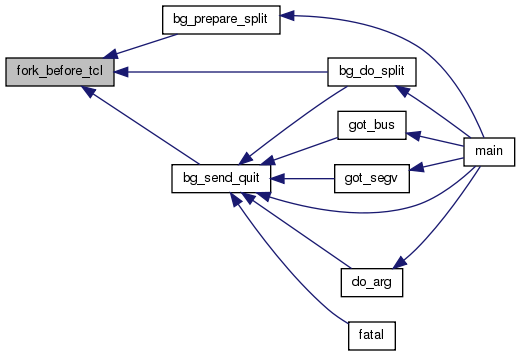
| void list_timers | ( | Tcl_Interp * | , | |
| tcl_timer_t * | ||||
| ) |
Definition at line 647 of file chanprog.c.
References argv, timer_str::cmd, EGG_CONST, egg_snprintf, timer_str::id, timer_str::mins, timer_str::next, and Tcl_Free.
Referenced by tcl_timers(), and tcl_utimers().
00648 { 00649 char mins[10], id[16], *x; 00650 EGG_CONST char *argv[3]; 00651 tcl_timer_t *mark; 00652 00653 for (mark = stack; mark; mark = mark->next) { 00654 egg_snprintf(mins, sizeof mins, "%u", mark->mins); 00655 egg_snprintf(id, sizeof id, "timer%lu", mark->id); 00656 argv[0] = mins; 00657 argv[1] = mark->cmd; 00658 argv[2] = id; 00659 x = Tcl_Merge(3, argv); 00660 Tcl_AppendElement(irp, x); 00661 Tcl_Free((char *) x); 00662 } 00663 }

| void rem_cd_tcl_cmds | ( | cd_tcl_cmd * | ) |
Definition at line 432 of file tcl.c.
References interp, and _cd_tcl_cmd::name.
00433 { 00434 while (table->name) { 00435 Tcl_DeleteCommand(interp, table->name); 00436 table++; 00437 } 00438 }
| int remove_timer | ( | tcl_timer_t ** | , | |
| unsigned | long | |||
| ) |
Definition at line 583 of file chanprog.c.
References timer_str::cmd, and nfree.
Referenced by tcl_killtimer(), and tcl_killutimer().
00584 { 00585 tcl_timer_t *old; 00586 int ok = 0; 00587 00588 while (*stack) { 00589 if ((*stack)->id == id) { 00590 ok++; 00591 old = *stack; 00592 *stack = ((*stack)->next); 00593 nfree(old->cmd); 00594 nfree(old); 00595 } else 00596 stack = &((*stack)->next); 00597 } 00598 return ok; 00599 }

| int tcl_resultempty | ( | ) |
Definition at line 463 of file tcl.c.
References tcl_resultstring().
Referenced by add_note(), answer_local_whom(), cmd_chat(), cmd_whom(), remote_tell_who(), and tell_who().
00463 { 00464 const char *result; 00465 result = tcl_resultstring(); 00466 return (result && result[0]) ? 0 : 1; 00467 }

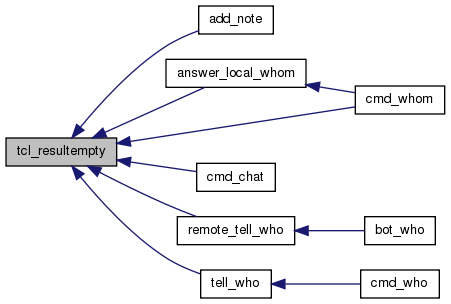
| int tcl_resultint | ( | ) |
Definition at line 470 of file tcl.c.
Referenced by call_tcl_func(), cmd_chat(), and cmd_whom().
00471 { 00472 int result; 00473 #ifdef USE_TCL_OBJ 00474 if (Tcl_GetIntFromObj(NULL, Tcl_GetObjResult(interp), &result) != TCL_OK) 00475 #else 00476 if (Tcl_GetInt(NULL, interp->result, &result) != TCL_OK) 00477 #endif 00478 result = 0; 00479 return result; 00480 }
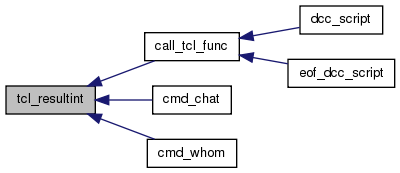
| const char* tcl_resultstring | ( | ) |
Definition at line 452 of file tcl.c.
References interp.
Referenced by answer_local_whom(), call_tcl_func(), cmd_set(), cmd_tcl(), remote_tell_who(), tcl_resultempty(), tell_verbose_status(), and tell_who().
00453 { 00454 const char *result; 00455 #ifdef USE_TCL_OBJ 00456 result = Tcl_GetStringResult(interp); 00457 #else 00458 result = interp->result; 00459 #endif 00460 return result; 00461 }
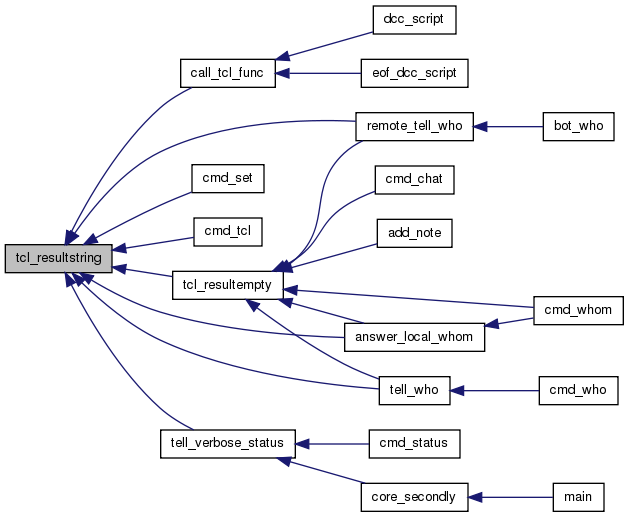
| int tcl_threaded | ( | ) |
Definition at line 1090 of file tcl.c.
Referenced by fork_before_tcl(), and tell_verbose_status().
01091 { 01092 #ifdef HAVE_TCL_GETCURRENTTHREAD 01093 if (Tcl_GetCurrentThread() != (Tcl_ThreadId)0) 01094 return 1; 01095 #endif 01096 01097 return 0; 01098 }
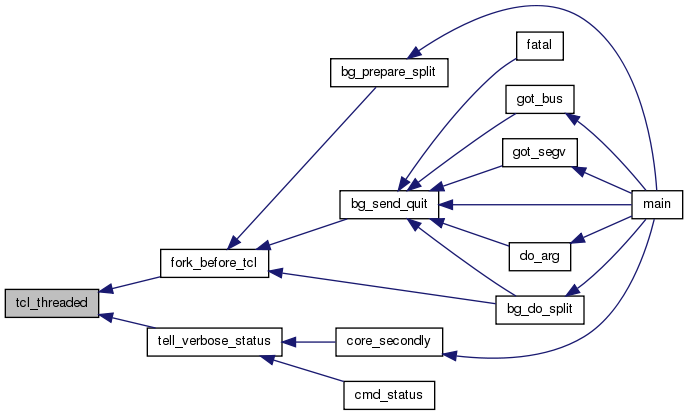
| void | ( | (void(*)(tcl_ints *)) | global[17] | ) |
Definition at line 1034 of file tcl.c.
References interp, _tcl_int::name, nfree, NULL, strtot, and tcl_eggint().
01035 { 01036 int i, f; 01037 intinfo *ii; 01038 01039 f = TCL_GLOBAL_ONLY | TCL_TRACE_READS | TCL_TRACE_WRITES | TCL_TRACE_UNSETS; 01040 for (i = 0; list[i].name; i++) { 01041 ii = (intinfo *) Tcl_VarTraceInfo(interp, list[i].name, f, tcl_eggint, 01042 NULL); 01043 Tcl_UntraceVar(interp, list[i].name, f, tcl_eggint, (ClientData) ii); 01044 if (ii) { 01045 strtot -= sizeof(intinfo); 01046 nfree(ii); 01047 } 01048 } 01049 }

| void | ( | (void(*)(tcl_ints *)) | global[16] | ) |
Definition at line 1012 of file tcl.c.
References interp, _tcl_int::name, nmalloc, NULL, protect_readonly, _tcl_int::readonly, intinfo::ro, strtot, tcl_eggint(), _tcl_int::val, and intinfo::var.
01013 { 01014 int i, tmp; 01015 intinfo *ii; 01016 01017 for (i = 0; list[i].name; i++) { 01018 ii = nmalloc(sizeof *ii); 01019 strtot += sizeof(intinfo); 01020 ii->var = list[i].val; 01021 ii->ro = list[i].readonly; 01022 tmp = protect_readonly; 01023 protect_readonly = 0; 01024 tcl_eggint((ClientData) ii, interp, list[i].name, NULL, TCL_TRACE_WRITES); 01025 protect_readonly = tmp; 01026 tcl_eggint((ClientData) ii, interp, list[i].name, NULL, TCL_TRACE_READS); 01027 Tcl_TraceVar(interp, list[i].name, 01028 TCL_TRACE_READS | TCL_TRACE_WRITES | TCL_TRACE_UNSETS, 01029 tcl_eggint, (ClientData) ii); 01030 } 01031 01032 }

| void | ( | (void(*)(tcl_coups *)) | global[210] | ) |
Definition at line 1073 of file tcl.c.
References interp, _tcl_coups::name, nfree, NULL, strtot, and tcl_eggcouplet().
01074 { 01075 int i, f; 01076 coupletinfo *cp; 01077 01078 f = TCL_GLOBAL_ONLY | TCL_TRACE_READS | TCL_TRACE_WRITES | TCL_TRACE_UNSETS; 01079 for (i = 0; list[i].name; i++) { 01080 cp = (coupletinfo *) Tcl_VarTraceInfo(interp, list[i].name, f, 01081 tcl_eggcouplet, NULL); 01082 strtot -= sizeof(coupletinfo); 01083 Tcl_UntraceVar(interp, list[i].name, f, tcl_eggcouplet, (ClientData) cp); 01084 nfree(cp); 01085 } 01086 }

| void | ( | (void(*)(tcl_coups *)) | global[209] | ) |
Definition at line 1053 of file tcl.c.
References interp, coupletinfo::left, _tcl_coups::lptr, _tcl_coups::name, nmalloc, NULL, coupletinfo::right, _tcl_coups::rptr, strtot, and tcl_eggcouplet().
01054 { 01055 coupletinfo *cp; 01056 int i; 01057 01058 for (i = 0; list[i].name; i++) { 01059 cp = nmalloc(sizeof *cp); 01060 strtot += sizeof(coupletinfo); 01061 cp->left = list[i].lptr; 01062 cp->right = list[i].rptr; 01063 tcl_eggcouplet((ClientData) cp, interp, list[i].name, NULL, 01064 TCL_TRACE_WRITES); 01065 tcl_eggcouplet((ClientData) cp, interp, list[i].name, NULL, 01066 TCL_TRACE_READS); 01067 Tcl_TraceVar(interp, list[i].name, 01068 TCL_TRACE_READS | TCL_TRACE_WRITES | TCL_TRACE_UNSETS, 01069 tcl_eggcouplet, (ClientData) cp); 01070 } 01071 }

| void | ( | (void(*)(tcl_strings *)) | global[19] | ) |
Definition at line 995 of file tcl.c.
References interp, _tcl_strings::name, nfree, NULL, strtot, and tcl_eggstr().
00996 { 00997 int i, f; 00998 strinfo *st; 00999 01000 f = TCL_GLOBAL_ONLY | TCL_TRACE_READS | TCL_TRACE_WRITES | TCL_TRACE_UNSETS; 01001 for (i = 0; list[i].name; i++) { 01002 st = (strinfo *) Tcl_VarTraceInfo(interp, list[i].name, f, tcl_eggstr, 01003 NULL); 01004 Tcl_UntraceVar(interp, list[i].name, f, tcl_eggstr, st); 01005 if (st != NULL) { 01006 strtot -= sizeof(strinfo); 01007 nfree(st); 01008 } 01009 } 01010 }
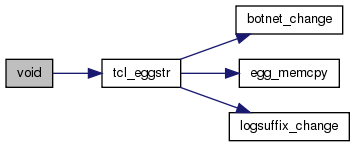
| void | ( | (void(*)(tcl_strings *)) | global[18] | ) |
Definition at line 971 of file tcl.c.
References _tcl_strings::buf, strinfo::flags, _tcl_strings::flags, interp, _tcl_strings::length, strinfo::max, _tcl_strings::name, nmalloc, NULL, protect_readonly, strinfo::str, STR_DIR, STR_PROTECT, strtot, and tcl_eggstr().
00972 { 00973 int i; 00974 strinfo *st; 00975 int tmp; 00976 00977 for (i = 0; list[i].name; i++) { 00978 st = nmalloc(sizeof *st); 00979 strtot += sizeof(strinfo); 00980 st->max = list[i].length - (list[i].flags & STR_DIR); 00981 if (list[i].flags & STR_PROTECT) 00982 st->max = -st->max; 00983 st->str = list[i].buf; 00984 st->flags = (list[i].flags & STR_DIR); 00985 tmp = protect_readonly; 00986 protect_readonly = 0; 00987 tcl_eggstr((ClientData) st, interp, list[i].name, NULL, TCL_TRACE_WRITES); 00988 protect_readonly = tmp; 00989 tcl_eggstr((ClientData) st, interp, list[i].name, NULL, TCL_TRACE_READS); 00990 Tcl_TraceVar(interp, list[i].name, TCL_TRACE_READS | TCL_TRACE_WRITES | 00991 TCL_TRACE_UNSETS, tcl_eggstr, (ClientData) st); 00992 } 00993 }
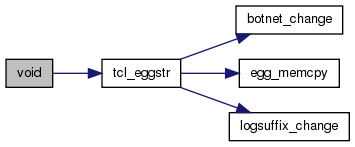
| void | ( | (void(*)(tcl_cmds *)) | global[15] | ) |
Definition at line 424 of file tcl.c.
References interp, and _tcl_cmds::name.
00425 { 00426 int i; 00427 00428 for (i = 0; table[i].name; i++) 00429 Tcl_DeleteCommand(interp, table[i].name); 00430 }
| void | ( | (void(*)(tcl_cmds *)) | global[14] | ) |
| void wipe_timers | ( | Tcl_Interp * | , | |
| tcl_timer_t ** | ||||
| ) |
Definition at line 632 of file chanprog.c.
References timer_str::next, nfree, and NULL.
Referenced by cmd_restart().
00633 { 00634 tcl_timer_t *mark = *stack, *old; 00635 00636 while (mark) { 00637 old = mark; 00638 mark = mark->next; 00639 nfree(old->cmd); 00640 nfree(old); 00641 } 00642 *stack = NULL; 00643 }

Variable Documentation
const LocaleTable localeTable[] [static] |
Definition at line 216 of file tclegg.h.
Referenced by init_tcl().

 1.6.1
1.6.1